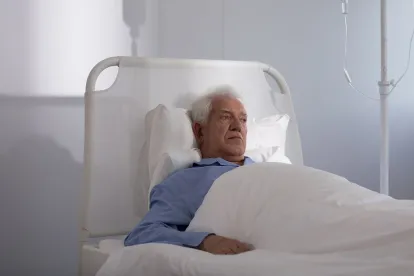Last week, the Department of Justice (“DOJ”) and Attorney General William P. Barr announced its National Nursing Home Initiative (“Initiative”). The goal of the Initiative is to “bring to justice those [nursing home] owners and operators who put profits before patients” and “ensure that the residents receive the care to which they are entitled.” Speaking at an event entitled “Keeping Seniors Safe” in Tampa, Florida, Attorney General Barr announced the Initiative as DOJ’s strategy to combat the “grossly substandard care” provided to residents of the “worst nursing homes around the country.”
Both the Attorney General’s remarks and DOJ’s press releases emphasize the commitment to “use every available tool to pursue nursing homes that provide grossly-substandard care to their residents,” including pursuing both criminal and civil legal claims against the culpable parties. Importantly, Attorney General Barr stressed that whistleblowers will play a crucial role in effectively carrying out the Initiative, stating:
Every one of us must do our part too . . . If you work in a nursing facility or with EMS and see something out of the ordinary, report it. And if you are the owner or manager of a nursing facility and you need assistance, please reach out.”
While putting an immediate stop to the abuse occurring in nursing homes is the top priority, it is important to note that such abuse or substandard care can often also lead to substantial civil liability for the nursing homes under the False Claims Act (“FCA”). The FCA prohibits nursing homes from submitting false claims to the United States Government for reimbursement under federal health care programs such as Medicare and Medicaid. If a nursing home violates the FCA, it can be liable for up to three times the amount of federal money it has fraudulently received and also be subject to additional civil penalties for each false claim submitted.
Examples of such false claims in previous FCA cases against nursing homes include: 1) providing unnecessary and dangerous therapy treatments, 2) billing for services not actually provided, and 3) falsely certifying that patients are eligible for certain reimbursable services. Importantly, the FCA allows private citizens, known as relators, to file a qui tam lawsuit on behalf of the Government when they know of potential FCA violations. These realtors are entitled to receive a percentage of any recovery the Government obtains based upon by their whistleblowing.
While the FCA has up to this point been used somewhat sparingly to combat substandard care in nursing homes, it has proven a viable theory for FCA liability on several occasions. In order to participate and receive reimbursements under Medicare and Medicaid, nursing homes must follow all applicable laws, regulations, and rules, many of which deal directly with the quality of care provided, including the Nursing Home Reform Act. The Nursing Home Reform Act requires nursing homes to maintain quality of life and care levels for Medicare and Medicaid patients. Specifically, nursing homes are required to “provide services to attain or maintain the highest practicable physical, mental, and psychosocial well-being of each resident.”
Under the FCA’s false certifications theory, a payment request that either explicitly or implicitly certifies the party requesting payment is in compliance with all applicable statutes, regulations, and rules when the party is, in fact, not in compliance, can be considered a false claim. Therefore, claims submitted to Medicare and Medicaid by nursing homes can be false if they fail to meet their standard of care obligations and do not disclose such noncompliance when submitting the claims.
Based on the announcements last week, DOJ appears eager to aggressively utilize the FCA in carrying out the Initiative against substandard nursing home care. As explained by Assistant Attorney General Jody Hunt, who leads DOJ’s Civil Division, DOJ “has a long history of holding nursing homes and long-term care providers accountable when they fail to provide their Medicare and Medicaid residents with even the most basic nursing services. Through this National Initiative, we will more effectively and quickly pursu




 />i
/>i

